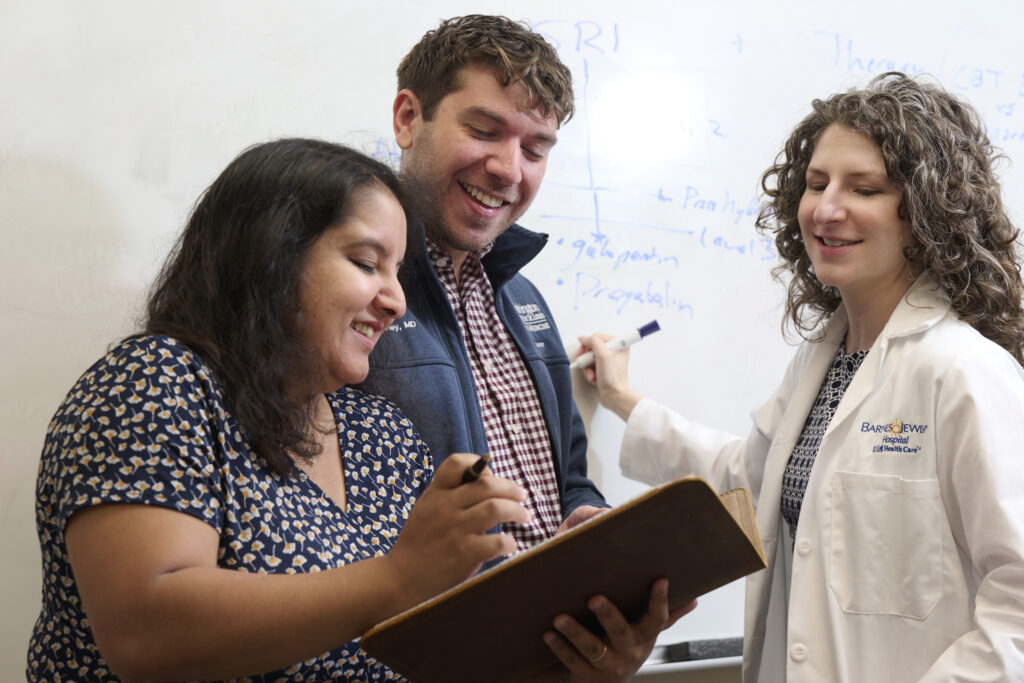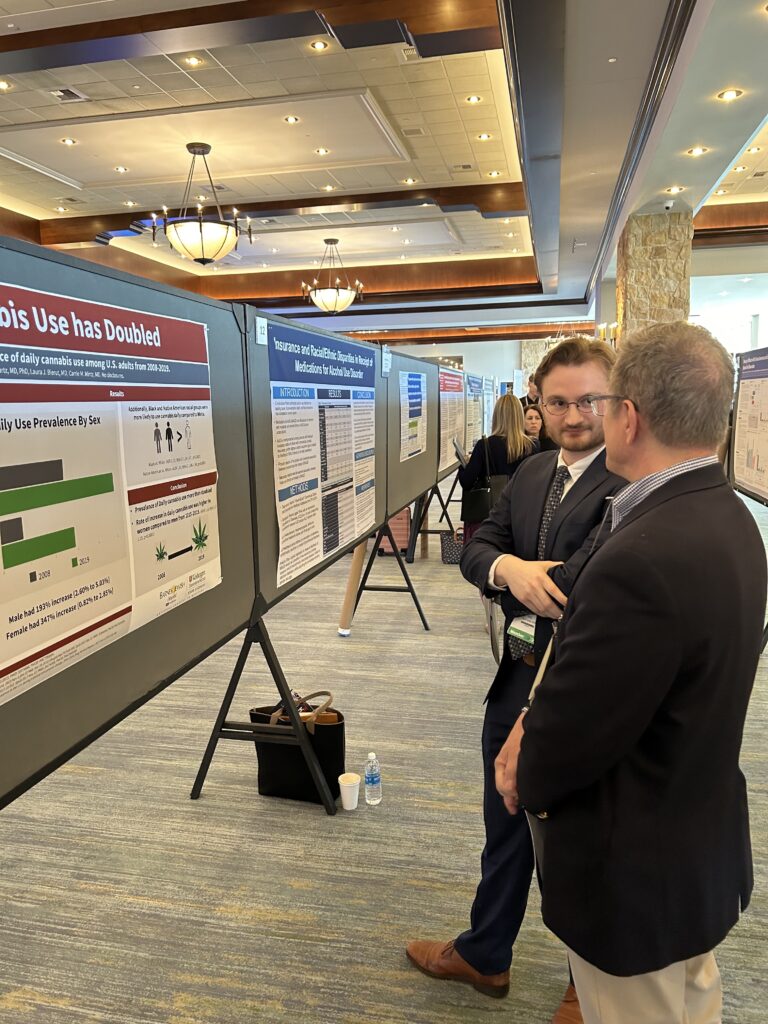
Washington University School of Medicine has consistently been ranked as a top 10 research university with a mean rank in NIH funding of 4.1. For those residents interested in exploring research, we are able to provide outstanding research mentors from an internationally recognized faculty.
Faculty mentorship
One of the keys to a successful academic career is a knowledgeable faculty mentor. Our expert faculty take pride in developing quality interactions with trainees and routinely produce more than 300 publications each year, usually co-authored with trainees. These papers make an impact with other researchers, at a median faculty h-index of 22.5. Faculty are well-connected nationally and internationally with service to various committees and panels. These connections are important as trainees begin to navigate their independent careers.
Faculty from other departments are also available to serve as research and career mentors to our residents. There are over 150 faculty at Washington University in St. Louis who conduct research in areas relevant to psychiatric disorders including cellular and molecular neuroscience, neurology, psychology, psychiatry, anesthesiology, genetics, epidemiology, and public health.
Research training opportunities
During residency
Residents interested in an academic research career can participate in our Psychiatry Residency Research Education Program (PRREP). Residents who do not wish to pursue such an intensive research experience may select research for one or both of their selective blocks during PGY2 or for any of their 4 months of their PGY4 elective time.
After residency
Residents desiring a more intensive exposure to research after residency may be able to participate in one or more additional years of research training as a research fellow.
Psychiatry Residency Research Education Program (PRREP)
The Psychiatry Residency Research Education Program (PRREP) seeks to provide early training in research to enhance success at subsequent stages of residents’ careers. PRREP represents formalized research mentorship to those residents interested in research.
This program is open to any resident, regardless of prior research experience. Whether you’re an MD/PhD with lots of research experience or you didn’t do much research during medical school, we tailor our program to develop and maximize your individual skills.
Most residents typically will choose to take part in the program starting in the first year of residency. It is expected that some trainees, as they explore research, will not pursue the more advance PRREP phase. Funds (up to $25K total during residency training) are available to support research and travel costs through an NIH R25 grant.
PRREP structure
PRREP has been structured to provide a longitudinal research training experience across all years to individuals in both the general adult psychiatry program (4 years) and the child and adolescent psychiatry program (5 years). The program is composed of two phases.
Phase 1: Exploration
The first phase of PRREP occurs during PGY1 and 2 and is designed to allow residents to explore the possibility of research as a career option.
In addition to mentoring and didactic time, residents will devote 2 PGY2 elective blocks (approximately 2 months) to research.
For those residents with substantial research experience (e.g. MD/PhD), the available PRREP time is used to begin their formal research projects during this exploration phase.
| PGY | Time on Research Rotations | Didactics, Courses, Meetings | Milestones |
|---|---|---|---|
| 1 | Monthly advisor and/or mentor meetings Weekly department research conference 10-hour research seminar | Identify research mentor Create career development goals Create PGY2 research proposal | |
| 2 | 16% FTE | Mentor Meetings Weekly research conference 12-hour research course Individualized coursework | Work on initial career development goals Carryout PGY2 research Develop initial Phase 2 research proposal |
Phase 2: In-depth training
The second phase is a more intensive program that begins in PGY3 and runs the rest of residency training. It is designed for those residents who, after Phase 1, have decided to continue pursuing a career in academic psychiatry.
This second phase provides for in-depth training in research, including a formal research project, career mentoring, and didactics. Residents will have 15% of their third year dedicated to research efforts.
| PGY | Time on Research Rotations | Didactics, Courses, Meetings | Milestones |
|---|---|---|---|
| 3 | 15% FTE | Mentor meetings Weekly research conference PRREP research seminar Individualized coursework | Modify career development goals and research proposal by end of PGY3 |
Adult Residents
Residents staying in the general adult program will then have 8 months of their PG4 year to finish carrying out their research projects. In total, adult residents will have approximately 12 months of hands-on research time over the four years.
| PGY | Time on Research Rotations | Didactics, Courses, Meetings | Milestones |
|---|---|---|---|
| 4 | 67% FTE | Mentor meetings Weekly research conference Leadership course Individualized coursework | Present results at poster and oral sessions Publication/presentation of results at meetings |
Child & Adolescent Psychiatry Fellows
Residents who decide to pursue training in child and adolescent psychiatry at Washington University can continue to be in PRREP and will have approximately 10 months of dedicated research time spread over their two CAP training years.
| PGY | Time on Research Rotations | Didactics, Courses, Meetings | Milestones |
|---|---|---|---|
| 4 | 30% FTE | Mentor meetings Weekly research conference Leadership course Individualized coursework | Modify career and research goals as needed |
| 5 | 50% FTE | Mentor meetings Weekly research conference Individualized coursework | Present results at poster and oral sessions Publication/presentation of results at meetings |
Joining PRREP
PRREP is not a specific training track (with a separate ACGME program number) to which applicants must apply prior to joining our program. Rather, it is a training path available to any resident in our program. Such an approach allows for us to train more than just the 1 or 2 residents that other research track programs typically can accommodate. It also does not force applicants to choose prior to residency training what type of career they will have. Instead it is designed to be flexible and to allow residents to explore the possibility of a career in research prior to committing to that career pathway.
Residents typically request to join Phase 1 of PRREP in their first year so that they can have the time to meet with a mentor and optimally plan for their second year research rotations. There is no maximum number of residents that can take part in PRREP, nor is there a minimum educational requirement. Historically, approximately ⅓-⅔ of the interns join PRREP each year.
Residents opting to continue into Phase 2 submit a detailed research and career development plan, which has to be approved by the supervising faculty before entering into Phase 2.
Applicants to the residency program who are interested in PRREP are encouraged to indicate such interest at the time they apply so that we can be prepared to discuss the interest during the interview process.
Mentorship in PRREP
We have created a core group of faculty advisors and mentors whom the majority of participants will likely use for their training. Each PRREP resident begins working with one of these individuals during Phase 1 in order to identify an area of research interest and a research project.
Trainees might also use one of over 150 university faculty members who have significant research experience and extramural support in the broad areas of research relevant to psychiatry as a co-mentor in whose lab they will conduct research. These areas of research include cellular and molecular neuroscience, neurology, psychology, psychiatry, anesthesiology, genetics, epidemiology, and public health.
Faculty |
Department |
Group |
| Arpana Agrawal | Psychiatry | Genetics* |
| Deanna Barch | Psychology | Imaging |
| Laura Bierut | Psychiatry | Genetics |
| Kevin Black | Psychiatry | Imaging |
| Patty Cavazos-Rehg | Psychiatry | Genetics |
| Carlos Cruchaga | Psychiatry | Genetics |
| Joseph Dougherty | Genetics | Basic |
| Andrew Heath | Psychiatry | Genetics |
| Tamara Hershey | Psychiatry | Imaging |
| Adam Kepecs | Neuroscience | Basic |
| Eric Lenze | Psychiatry | Clinical |
| Joan Luby | Psychiatry | Clinical |
| Jordan McCall | Anesthesiology | Basic |
| Steven Mennerick | Psychiatry | Basic |
| Ben Palanca | Anesthesiology | Clinical |
| Susan Perlman | Psychiatry | Clinical |
| John Pruett | Psychiatry | Imaging |
| Cynthia Rogers | Psychiatry | Clinical |
| Chad Sylvester | Psychiatry | Imaging |
| Charles Zorumski | Psychiatry | Basic |
*Human Genetics, Public Health, Epidemiology
PRREP Outcomes
The mentoring and structure of PRREP creates a strong academic ethos in our training program that has allowed our residents to thrive. Their accomplishments have been amazing. In addition to winning awards and presenting their work at national and international meetings they have co-authored a very large number of research articles. Since its inception in 2016, our PRREP residents have been authors on over 100 publications. Of the 22 residents who have finished the PRREP program 16 have opted for a career in academic psychiatry with the vast majority choosing to undergo extensive research training via a T32 training grant mechanism.
